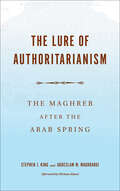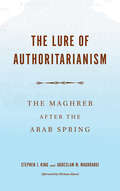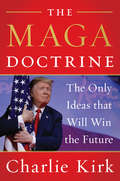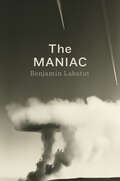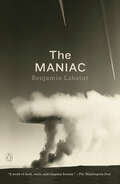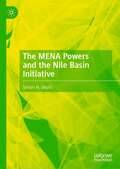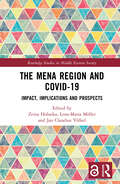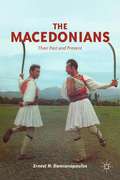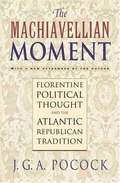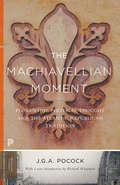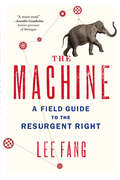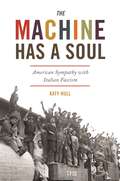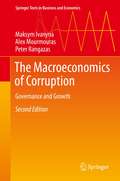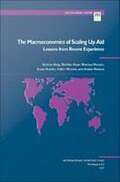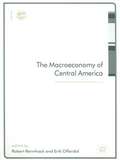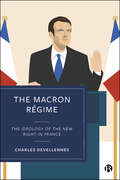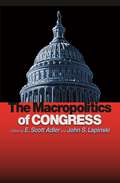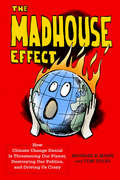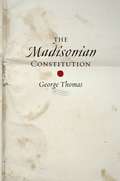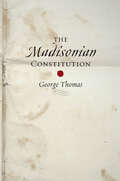- Table View
- List View
The Lure of Authoritarianism: The Maghreb after the Arab Spring (Indiana Series In Middle East Studies)
by Abdeslam M. Maghraoui Stephen J. KingThe works collected in The Lure of Authoritarianism consider the normative appeal of authoritarianism in light of the 2011 popular uprisings in the Middle East. Despite what seemed to be a popular revolution in favor of more democratic politics, there has instead been a slide back toward authoritarian regimes that merely gesture toward notions of democracy. In the chaos that followed the Arab Spring, societies were lured by the prospect of strong leaders with firm guiding hands. The shift toward normalizing these regimes seems sudden, but the works collected in this volume document a gradual shift toward support for authoritarianism over democracy that stretches back decades in North Africa. Contributors consider the ideological, socioeconomic, and security-based justifications of authoritarianism as well as the surprising and vigorous reestablishment of authoritarianism in these regions. With careful attention to local variations and differences in political strategies, the volume provides a nuanced and sweeping consideration of the changes in the Middle East in the past and what they mean for the future.
The Lure of Authoritarianism: The Maghreb after the Arab Spring (Indiana Series in Middle East Studies)
by Abdeslam M. Maghraoui Hicham Alaoui Stephen J. KingThe works collected in The Lure of Authoritarianism consider the normative appeal of authoritarianism in light of the 2011 popular uprisings in the Middle East. Despite what seemed to be a popular revolution in favor of more democratic politics, there has instead been a slide back toward authoritarian regimes that merely gesture toward notions of democracy. In the chaos that followed the Arab Spring, societies were lured by the prospect of strong leaders with firm guiding hands. The shift toward normalizing these regimes seems sudden, but the works collected in this volume document a gradual shift toward support for authoritarianism over democracy that stretches back decades in North Africa. Contributors consider the ideological, socioeconomic, and security-based justifications of authoritarianism as well as the surprising and vigorous reestablishment of authoritarianism in these regions. With careful attention to local variations and differences in political strategies, the volume provides a nuanced and sweeping consideration of the changes in the Middle East in the past and what they mean for the future.
The Lyin Kings: The Wannabe World Leaders
by Irene PetteiceThe Lyin Kings. The Wannabe World Rulers. Two people, a man and a woman who fought for power in 2008, may once again do battle in 2016. This time, will it be up to the Illuminati, the gay world, the Illegals, FEMA, or the Militia that will decides who wins or loses. Hillary Clinton, a confessed Socialist, and Barack Obama, a practicing Socialist, both want to lead the world, not our country; both want to destroy our Constitution and Declaration of Independence; both were students and worshipers of Saul Alinsky. Clinton who has no acclaim as a former Secretary of State and Obama who has become the worst President we have ever had. Obama will not give up his kingdom easily and will call martial law, if necessary, in order to thwart the 2016 election.
The MAGA Diaries: Life Among the Fanatics, Extremists, and True Believers that Created the Modern Right
by Tina NguyenThis explosive &“must-read for anyone who cares about the future of our democracy&” (Brian Stelter, New York Times bestselling author) chronicles the rise of the MAGA movement from acclaimed political journalist Tina Nguyen, who began her career—and her education—on the ground levels of the conservative recruiting machine.Her very first job was working for a little-known journalist named Tucker Carlson. She&’s chugged Mountain Dews with the first Breitbart writers, poured over conspiracy theories from COVID-19 deniers, and visited the apocalyptic Patriot Church deep in the woods of the Pacific Northwest. The right is now a MAGA cult. And Tina Nguyen knows because she was raised by it, back when it wasn&’t one. In 2008, in the weeks leading up to the election of Barack Obama, Nguyen was a history-loving, politics-obsessed college student at Claremont McKenna College, drawn there by a boyfriend—and a research institute called the Salvatori Center for the Study of Individual Freedom. Swept up by pro-America rhetoric and promises of a career in journalism, Nguyen was drawn into the world of right-wing student activism, and the early days of the movement now known as MAGA. In The MAGA Diaries, she tells not only her story of loving and leaving the conservative movement but the history of the right wing, painting a shocking picture of how they recruit, train, and indoctrinate generations of young people and shape them into the influential leaders and the supporting cast of tomorrow&’s Republican party. They are ruthless in building robust networks of power, even if it means demolishing entire civic institutions, from women&’s rights to fair elections—and staging a coup when it doesn&’t work out. In this &“sobering, endlessly readable fly-on-the-wall account of creeping fascism&” (Kirkus Reviews, starred review), Nguyen pulls back the curtain on the conservative machine, shining a light on the systematized on-ramp for young Republicans. These are the new leaders of the right, and it&’s urgent we start paying attention.
The MAGA Doctrine: The Only Ideas That Will Win the Future
by Charlie KirkNEW YORK TIMES BESTSELLER.The movement that brought Donald Trump to the White House has better ideas than the old right or the new left. It’s time that the rest of America started listening.The Tea Party began as a protest for patriots who feared Big Government. President Trump has become a hero for patriots who are against Big Everything. Fed up with Silicon Valley, the media, liberal higher education, the military-industrial complex, Twitter mobs, swamp monsters, Big Pharma, out-of-control prosecutors, and gun-grabbing fascists, ordinary Americans miss the days when America cared about rule of the people, by the people, and for the people. Remember when you didn’t feel bombarded on all sides by coastal billionaires and their government stooges? The MAGA Doctrine urges an overdue restoration of self-rule by a populace long taken for granted by its rulers. Turning Point USA founder and social media superstar Charlie Kirk explains once and for all why a New York real estate magnate found an audience among young conservatives all over the country. Trump and his allies are working to protect all the small things that both parties dismissed: local businesses, families, churches, and the rights of the individual. Kirk explains why it took a reality TV superstar to see past the sclerotic and power-hungry institutions, from the United Nations and Google to Harvard and Viacom, working to crush real America. The Trump Doctrine is all about giving you a say in the future of America and a hand in making it happen. As the mainstream media keep churning out lies about the “real reasons” behind the new conservative agenda, Charlie Kirk’s The MAGA Doctrine is a powerful reminder of the true narrative of freedom and greatness that swept Donald Trump to the presidency.
The MANIAC
by Benjamin LabatutFrom one of contemporary literature&’s most exciting new voices, a haunting story centered on the Hungarian polymath John von Neumann, tracing the impact of his singular legacy on the dreams and nightmares of the twentieth century and the nascent age of AIBenjamín Labatut&’s When We Cease to Understand the World electrified a global readership. A Booker Prize and National Book Award finalist, and one of the New York Times&’ Ten Best Books of the Year, it explored the life and thought of a clutch of mathematicians and physicists who took science to strange and sometimes dangerous new realms. In The MANIAC, Labatut has created a tour de force on an even grander scale.A prodigy whose gifts terrified the people around him, John von Neumann transformed every field he touched, inventing game theory and the first programable computer, and pioneering AI, digital life, and cellular automata. Through a chorus of family members, friends, colleagues, and rivals, Labatut shows us the evolution of a mind unmatched and of a body of work that has unmoored the world in its wake.The MANIAC places von Neumann at the center of a literary triptych that begins with Paul Ehrenfest, an Austrian physicist and friend of Einstein, who fell into despair when he saw science and technology become tyrannical forces; it ends a hundred years later, in the showdown between the South Korean Go Master Lee Sedol and the AI program AlphaGo, an encounter embodying the central question of von Neumann's most ambitious unfinished project: the creation of a self-reproducing machine, an intelligence able to evolve beyond human understanding or control.A world of beauty and fabulous momentum, The MANIAC's unique blend of fact and fiction confronts us with the deepest questions we face as a species.
The MANIAC
by Benjamin LabatutThe national bestseller and New York Times Editor's Choice pick&“A contemporary writer of thrilling originality . . . The MANIAC is a work of dark, eerie and singular beauty.&” —The Washington Post &“Darkly absorbing . . . A brooding, heady narrative that is addictively interesting.&” —Wall Street Journal From one of contemporary literature&’s most exciting new voices, a haunting story centered on the Hungarian polymath John von Neumann, tracing the impact of his singular legacy on the dreams and nightmares of the twentieth century and the nascent age of AIBenjamín Labatut&’s When We Cease to Understand the World electrified a global readership. A Booker Prize and National Book Award finalist, and one of the New York Times&’ Ten Best Books of the Year, it explored the life and thought of a clutch of mathematicians and physicists who took science to strange and sometimes dangerous new realms. In The MANIAC, Labatut has created a tour de force on an even grander scale.A prodigy whose gifts terrified the people around him, John von Neumann transformed every field he touched, inventing game theory and the first programable computer, and pioneering AI, digital life, and cellular automata. Through a chorus of family members, friends, colleagues, and rivals, Labatut shows us the evolution of a mind unmatched and of a body of work that has unmoored the world in its wake.The MANIAC places von Neumann at the center of a literary triptych that begins with Paul Ehrenfest, an Austrian physicist and friend of Einstein, who fell into despair when he saw science and technology become tyrannical forces; it ends a hundred years later, in the showdown between the South Korean Go Master Lee Sedol and the AI program AlphaGo, an encounter embodying the central question of von Neumann's most ambitious unfinished project: the creation of a self-reproducing machine, an intelligence able to evolve beyond human understanding or control.A work of beauty and fabulous momentum, The MANIAC confronts us with the deepest questions we face as a species.
The MENA Powers and the Nile Basin Initiative
by Simon H. OkothThis book presents the current conflict in the Middle East and North Africa over the construction of the Grand Ethiopian Renaissance Dam (GERD), the biggest in Africa. The project explains why economic, and to some extent political, survival is at the core of the conflict, specifically between Egypt and Ethiopia. Although the problem started with insistence of “no dam” by Egypt and subsequently narrowed down to a filling up period of the reservoir and technical operations of the dam, finding a solution agreeable to both nations has been elusive for the past eight years. Ensuring water for all members in the Basin is consistent with the United Nations Sustainable Development Goal 6, particularly given the looming effects of climate change, increasing population, urbanization, and rising consumptive water uses.
The MENA Region and COVID-19: Impact, Implications and Prospects (Routledge Studies in Middle Eastern Society)
by Zeina HobaikaFocusing on the Middle East and North Africa (MENA) region, which comprises some of the world’s richest countries next to some of the poorest, this book offers excellent insights into the discriminatory consequences of the COVID-19 pandemic. With a geographic focus on the MENA region, the multidisciplinary case studies collected in this edited volume reveal that the coronavirus’s impact patterns are a question of two variables: governance performance and socioeconomic potency. Given the global, unprecedented, complex, and systemic nature of COVID-19 – and its long-term implications for societies, governments, international organisations, citizens and corporations – this volume entails a relevance to regions undergoing similar dynamics. Analyses in the book, therefore, have implications for the comparative study of the pandemic and its impact on societies around the globe. Understanding related dynamics and implications, and making use of lessons learned, are a pathway to deal with future similar crises. Questions covered in the volume are relevant to geopolitics, social implications and the relations between political leaders and citizens as beings embedded in various strategies of communication. The volume will appeal to scholars of international politics, political science, risk or crisis governance, economics and sociology, human rights and security, political communication and public health.
The Macedonians
by Ernest N. DamianopoulosOverturning the 20th century's prevalent view of the Macedonians, Damianopoulos uses three domains of evidence - historical documentation, cognitive self-descriptor reports, and sociocultural features - to demonstrate that the Macedonians are a unique, non-Slav, non-Greek, ethnic identity.
The Machiavellian Moment: Florentine Political Thought and the Atlantic Republican Tradition
by J. G. A. PocockThis book is a classic study of the consequences for modern historical and social consciousness of the ideal of the classical republic revived by Machiavelli and other thinkers of Renaissance Italy.
The Machiavellian Moment: Florentine Political Thought and the Atlantic Republican Tradition
by J. G. Pocock Richard WhatmoreOriginally published in 1975, The Machiavellian Moment remains a landmark of historical and political thought. Celebrated historian J.G.A. Pocock looks at the consequences for modern historical and social consciousness arising from the ideal of the classical republic revived by Machiavelli and other thinkers of Renaissance Italy. Pocock shows that Machiavelli's prime emphasis was on the moment in which the republic confronts the problem of its own instability in time, which Pocock calls the "Machiavellian moment."After examining this problem in the works of Machiavelli, Guicciardini, and Giannotti, Pocock turns to the revival of republican ideology in Puritan England and in Revolutionary and Federalist America. He argues that the American Revolution can be considered the last great act of civic humanism of the Renaissance and he relates the origins of modern historicism to the clash between civic, Christian, and commercial values in eighteenth-century thought.This Princeton Classics edition of The Machiavellian Moment features a new introduction by Richard Whatmore.
The Machine
by Lee FangWritten by the blogger who was the first to report on the lobbyists who planned the Tea Parties, A Field Guide to the Right is a groundbreaking, comprehensive exposé of the hidden plans to keep America on a rightward lurch. The book dissects the rise of "patriot" hate groups, reveals the role of New York City's most celebrated billionaire in financing the fodder for Glenn Beck and Congresswoman Michele Bachmann, and exposes how former Bush operatives and current trade association heads have cleverly adapted to crush Obama and progressive reform.For anyone interested in comprehending the new landscape of the conservative movement, here is an essential guide to the people, the money, and the strategies that make it tick.
The Machine Has a Soul: American Sympathy with Italian Fascism (America in the World #41)
by Katy HullA historical look at the American fascination with Italian fascism during the interwar periodIn the interwar years, the United States grappled with economic volatility, and Americans expressed anxieties about a decline in moral values, the erosion of families and communities, and the decay of democracy. These issues prompted a profound ambivalence toward modernity, leading some individuals to turn to Italian fascism as a possible solution for the problems facing the country. The Machine Has a Soul delves into why Americans of all stripes sympathized with Italian fascism, and shows that fascism’s appeal rested in the image of Mussolini’s regime as “the machine which will run and has a soul”—a seemingly efficient and technologically advanced system that upheld tradition, religion, and family.Katy Hull focuses on four prominent American sympathizers: Richard Washburn Child, a conservative diplomat and Republican operative; Anne O’Hare McCormick, a distinguished New York Times journalist; Generoso Pope, an Italian-American publisher and Democratic political broker; and Herbert Wallace Schneider, a Columbia University professor of moral philosophy. In fascism’s violent squads they saw youthful glamour and impeccable manners, in the megalomaniacal Mussolini they perceived someone both current and old-fashioned, and in the corporate state they witnessed a politics that could revive addled minds. They argued that with the right course of action, the United States could use fascism to take the best from modernity while withstanding its harmful effects.Investigating the motivations of American fascist sympathizers, The Machine Has a Soul offers provocative lessons about authoritarianism’s appeal during times of intense cultural, social, and economic strain.
The Macroeconomic Impact of Scaled-Up Aid: The Case of Niger
by Emilio Sacerdoti Gonzalo Salinas Abdikarim FarahA report from the International Monetary Fund.
The Macroeconomics of Corruption: Governance and Growth (Springer Texts in Business and Economics)
by Alex Mourmouras Peter Rangazas Maksym IvanynaThis textbook examines corruption through a macroeconomic lens, exploring the relationship between corruption, fiscal policy, and political economy. It merges macroeconomic growth models with elements of political economic theory to address important applied topics such as income inequality within and across countries, growth slowdowns, and fiscal crises. Revised and updated to include new research findings and recent policy discussions, the second edition contains 15 new sections and 2 new chapters on topics such as public defaults, the wage elasticity of work and the interest elasticity of saving, and the economic and fiscal impact of the 2020 pandemic. Most of the basic ideas are illustrated using a two-period model of government investment that captures the future cost of policies that favor the present. The more subtle and advanced issues are illustrated and, in some cases, quantified, using the overlapping-generations model of economic growth. The models used to illustrate the mechanisms of economic growth are extended to incorporate politics and the behavior of public official. The text concludes with a thorough discussion of policy reforms designed to address the issues discussed in earlier chapters. Intended for students familiar with intermediate-level economics, the second edition contains a technical appendix, expanded end-of-chapter questions and problems, and a complete solutions manual. The second edition also offers updated resources for instructors, including sample syllabi and over 550 multiple choice questions. Offering a unified explanation for the causes and consequences of government failure, fiscal crisis, and needed policy reforms, this text is appropriate for advanced undergraduate and beginning graduate courses in macroeconomics, political economy, and public policy.
The Macroeconomics of Medium-Term Aid Scaling-Up Scenarios
by Andrew Berg Rafael Portillo Jan Gottschalk Luis-Felipe ZannaA report from the International Monetary Fund.
The Macroeconomics of Scaling Up Aid Lessons from Recent Experience
by Andrew Berg Shaun Roache Shekhar Aiyar Mumtaz Hussain Tokhir Mirzoev Amber MahoneThis study analyzes key issues associated with large increases in aid, including absorptive capacity, Dutch disease, and inflation. The authors develop a framework that emphasizes the different roles of monetary and fiscal policy and apply it to the recent experience of five countries: Ethiopia, Ghana, Mozambique, Tanzania, and Uganda. These countries have often found it difficult to coordinate monetary and fiscal policy in the face of conflicting objectives, notably to spend the aid money on domestic goods and to avoid excessive exchange rate appreciation.
The Macroeconomics of Scaling Up Aid: The Gleneagles Initiative for Benin
by Joannes Mongardini Issouf SamakeA report from the International Monetary Fund.
The Macroeconomy of Central America
by Robert Rennhack Erik OfferdalOpportunities for growth and investment in Central America could well improve in the coming years, as the region's ties with the world economy grow closer. This integration, however, also presents important challenges for economic policy to ensure that growth can be sustained and can benefit the poor. This book stresses the importance of keeping fiscal policy on a sustainable path, strengthening public investment in basic infrastructure and primary health care and primary and secondary education, and managing the risks associated with partial dollarization.
The Macron Régime: The Ideology of the New Right in France
by Charles DevellennesWhen Emmanuel Macron was elected President of the French Republic, it ended the long-standing political alternation between the mainstream right- and left-wing parties. This book examines Macron’s political career from his rise as a public figure to his time as a president. The book explores Macron’s political ideology and examines the enactment of the key notions of security, merit and hope during his time in office. By offering a close study of his actions and ideological commitment, this book argues that, despite claims of being ideologically neutral, Macron actually represents a new form of right-wing politics in France.
The Macropolitics of Congress
by E. Scott Adler and John S. LapinskiHow do public laws, treaties, Senate confirmations, and other legislative achievements help us to gain insight into how our governmental system performs? This well-argued book edited by Scott Adler and John Lapinski is the first to assess our political institutions by looking at what the authors refer to as legislative accomplishment. The book moves beyond current research on Congress that focuses primarily on rules, internal structure, and the microbehavior of individual lawmakers, to look at the mechanisms that govern how policy is enacted and implemented in the United States. It includes essays on topics ranging from those dealing with the microfoundations of congressional output, to large N empirical analyses that assess current theories of lawmaking, to policy-centered case studies. All of the chapters take a Congress-centered perspective on macropolicy while still appreciating the importance of other branches of government in explaining policy accomplishment. The Macropolitics of Congress shines light on promising pathways for the exploration of such key issues as the nature of political representation. It will make a significant contribution to the study of Congress and, more generally, to our understanding of American politics. Contributors include E. Scott Adler, David Brady, Charles M. Cameron, Brandice Canes-Wrone, Robert S. Erikson, Grace R. Freedman, Valerie Heitshusen, John D. Huber, Ira Katznelson, Keith Krehbiel, John S. Lapinski, David Leblang, Michael B. MacKuen, David R. Mayhew, Nolan McCarty, Charles R. Shipan, James A. Stimson, and Garry Young.
The Madhouse Effect: How Climate Change Denial Is Threatening Our Planet, Destroying Our Politics, and Driving Us Crazy
by Michael Mann Tom TolesThe award-winning climate scientist Michael E. Mann and the Pulitzer Prize–winning political cartoonist Tom Toles have been on the front lines of the fight against climate denialism for most of their careers. They have witnessed the manipulation of the media by business and political interests and the unconscionable play to partisanship on issues that affect the well-being of billions. The lessons they have learned have been invaluable, inspiring this brilliant, colorful escape hatch from the madhouse of the climate wars. The Madhouse Effect portrays the intellectual pretzels into which denialists must twist logic to explain away the clear evidence that human activity has changed Earth's climate. Toles's cartoons collapse counter-scientific strategies into their biased components, helping readers see how to best strike at these fallacies. Mann's expert skills at science communication aim to restore sanity to a debate that continues to rage against widely acknowledged scientific consensus. The synergy of these two climate science crusaders enlivens the gloom and doom of so many climate-themed books—and may even convert die-hard doubters to the side of sound science.
The Madisonian Constitution
by George ThomasThis volume examines four crucial moments in the United States' political history--the Civil War and Reconstruction, the Progressive Era, Franklin Delano Roosevelt's presidency and the New Deal, and the Reagan revolution--to illustrate the Madisonian view that the present rise of judicial supremacy actually runs counter to the Constitution as established at the nation's founding.
The Madisonian Constitution (The Johns Hopkins Series in Constitutional Thought)
by George ThomasToday, we think of constitutional questions as being settled by the Supreme Court.But that is not always the case, nor is it what the framers intended in constructing the three-branch federal government. This volume examines four crucial moments in the United States' political history—the Civil War and Reconstruction, the Progressive Era, Franklin Delano Roosevelt's presidency and the New Deal, and the Reagan revolution—to illustrate the Madisonian view that the present rise of judicial supremacy actually runs counter to the Constitution as established at the nation’s founding.George Thomas opens by discussing how the Constitution encourages an antagonistic approach to settling disputes, thereby preserving itself as the nation's fundamental law rather then ceding that role to the president, Congress, or Supreme Court. In considering the four historical case studies, he focuses on judicial interpretations and the political branches' responses to them to demonstrate that competing conceptions of constitutional authority and meaning, as well as intergovernmental disputes themselves—rather than any specific outcome—strengthen the nature of the nation's founding document as a political instrument.Engagingly written and soundly argued, this study clarifies and highlights the political origins of the nation's foundational document and argues that American constitutionalism is primarily about countervailing power not legal limits enforced by courts.
